Overview
The article ‘Understanding In Home Health Care: A Complete Tutorial for Families’ highlights the essential role of in-home health care services for families who seek support for their loved ones. It acknowledges the feelings of concern that families often experience when considering care options. In-home health care provides personalized medical and personal assistance, significantly enhancing the quality of life and independence for individuals, especially seniors. As families increasingly prefer alternatives to institutional care, the demand for such services is growing.
In addition, the article emphasizes that in-home health care is not just about medical support; it’s about nurturing relationships and ensuring comfort at home. Families can feel reassured knowing that their loved ones receive care tailored to their unique needs, allowing them to thrive in a familiar environment. This approach not only addresses health concerns but also fosters emotional well-being, creating a holistic care experience.
Furthermore, by choosing in-home health care, families can enjoy peace of mind, knowing they are making a compassionate choice for their loved ones. The article encourages families to consider this option and reach out for more information, reminding them that they are not alone in this journey. Your comfort and the well-being of your loved ones are our priority, and we’re here for you every step of the way.
Introduction
In the realm of health care, home health care is emerging as a vital alternative for families seeking compassionate options beyond traditional institutional settings. This comprehensive approach brings essential medical services directly into the comfort of a patient’s home, allowing individuals—especially seniors and those with chronic conditions—to uphold their independence and dignity. With a dedicated team of professionals, including registered nurses and home health aides, home health care addresses not only medical needs but also emotional support and assistance with daily activities.
As the demand for these services continues to grow, understanding the nuances of home health care becomes crucial for families navigating their options. What if you could ensure your loved one receives personalized care in a familiar environment? This article explores the various aspects of home health care, highlighting its benefits and services offered. We will also clarify the critical distinctions between home health care and hospice care, empowering families to make informed decisions for their loved ones. Your comfort and peace of mind are our priority, and we’re here to support you every step of the way.
What is Home Health Care? An Overview
In home health care, in-home medical support encompasses a broad range of wellness services provided directly at an individual’s residence, customized to address specific requirements. This assistance is typically provided by a group of health professionals, including registered nurses, licensed practical nurses, therapists, and home health aides. Their responsibilities go beyond medical support to encompass personal assistance and help with daily living tasks, ensuring that individuals can preserve their independence and comfort in a familiar environment.
At Best Care Nurses Registry, we understand the importance of improving quality of life for individuals, especially seniors and those with long-term illnesses. Our services encompass skilled nursing support, physical therapy, occupational therapy, and assistance with activities of daily living (ADLs) such as bathing, dressing, and meal preparation. By obtaining assistance at their place, individuals can experience an enhanced sense of dignity and independence, which is essential for their emotional wellness.
Recent trends show a noteworthy transition towards residential support services, with an anticipated requirement for 924,000 personal support workers and in-home support workers between 2021 and 2031. This increase indicates the rising awareness of the advantages of at-home assistance, especially as over 1.4 million people presently live in Medicare- and Medicaid-certified nursing facilities, as reported by U.S. News & World Report. As families look for substitutes to institutional assistance, Best Care Nurses Registry distinguishes its offerings to appeal to clients who might otherwise contemplate nursing facility options.
Statistics show that a significant proportion of individuals favor receiving support in their own residences, emphasizing the efficiency of domestic support programs in enhancing individual independence. Specialist views consistently highlight the benefits of residential assistance, pointing out that it not only aids physical well-being but also promotes emotional stability and social involvement for seniors.
In 2025, the environment of residential support continues to progress, with a growing focus on individualized services that address the distinct requirements of each patient. This method not only improves the overall support experience but also aligns with the wider trend of prioritizing patient-focused services in the medical field. Best Care Nurses Registry, with its extensive experience and strong reputation, stands out as a leading family-owned provider of in-home health care services in South Florida, addressing the challenges posed by competition from nursing facilities while ensuring safety, convenience, and emotional support for seniors and their families.
If you are seeking compassionate and tailored support for your loved ones, we invite you to reach out to Best Care Nurses Registry today at (888) 203-2529. Let’s discuss your requirements and arrange a consultation. Our committed team is here to assist you and your family through the process of in-home health care support.
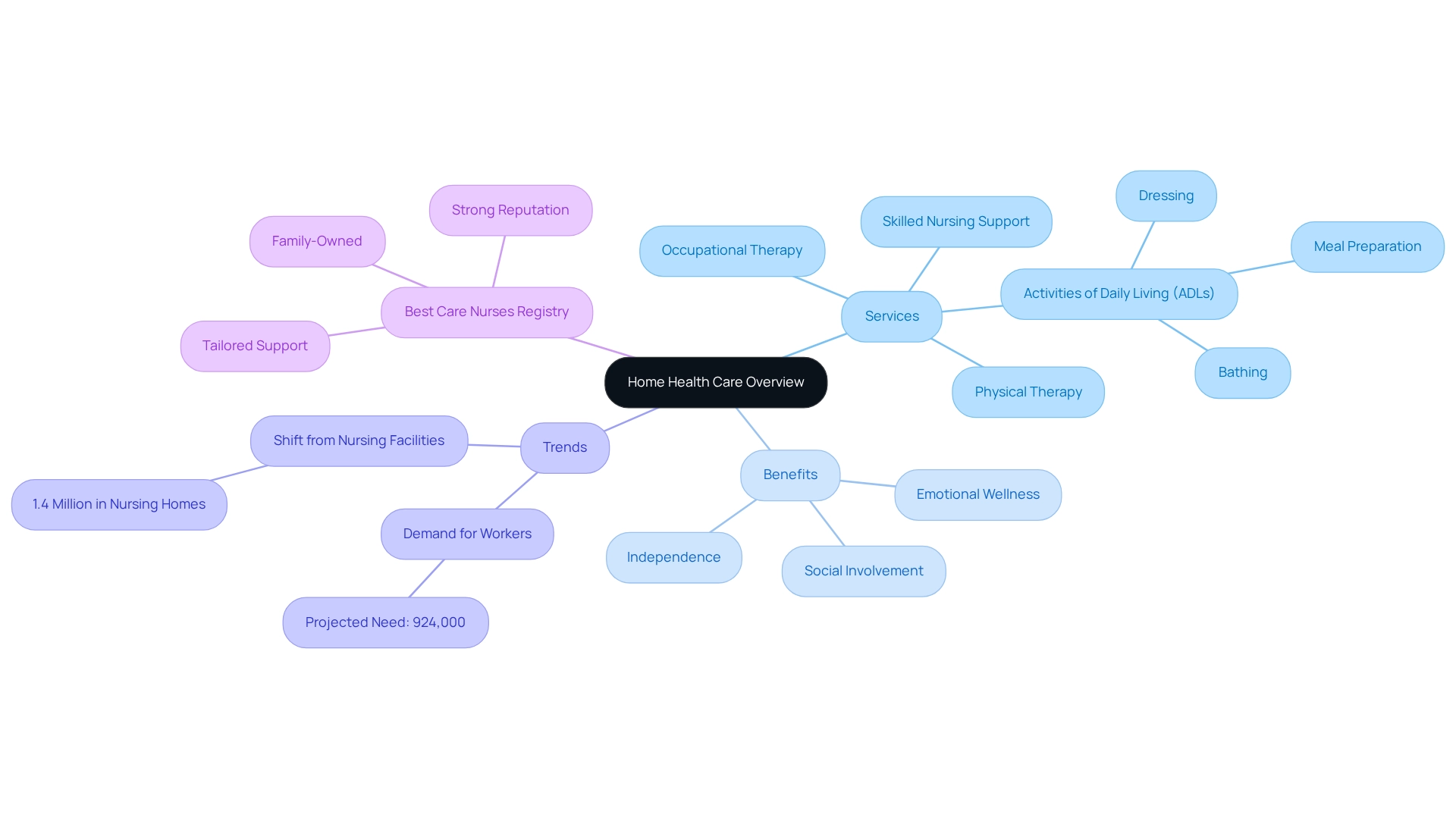
Home Health Care vs. Hospice Care: Key Differences
Home assistance and hospice services, while both providing essential support in a domestic setting, cater to different needs. Home medical support focuses primarily on rehabilitation and recovery, offering vital treatment and assistance with daily tasks for individuals recuperating from illness or injury. This type of support often includes:
- Skilled nursing
- Physical therapy
- Personal assistance
- Companionship
This enables patients to regain their independence and enhance their quality of life.
At Best Care Nurses Registry, we proudly serve cities such as Miami, Fort Lauderdale, and Boca Raton, ensuring that families in these areas have access to compassionate and cost-effective home health care.
Conversely, hospice support is specifically designed for individuals facing terminal illnesses, prioritizing comfort and quality of life over curative measures. This approach involves a multidisciplinary team that provides:
- Palliative care
- Emotional support
- Practical assistance
This support is offered to both individuals and their families throughout the end-of-life process. We ensure that our patients receive empathetic support that honors their dignity and choices.
As Dame Cicely Saunders, founder of the first modern hospice, poignantly stated, “You matter because of who you are. You matter to the last moment of your life, and we will do all we can, not only to help you die peacefully but also to live until you die.”
Recent statistics indicate that a significant percentage of patients receiving health services are engaged in rehabilitation efforts, while hospice assistance is essential for those requiring end-of-life support. Understanding these distinctions is crucial for families as they determine the most suitable type of support for their loved ones. For instance, a case study titled “Collaboration Between Hospice and Domestic Support” highlights the importance of effective communication between hospice organizations and private support providers in delivering comprehensive assistance.
By working together, these agencies can enhance the overall caregiving experience, ensuring that patients receive the support they need during challenging times.
In summary, while both home support and hospice services play vital roles in assisting individuals at home, their objectives and offerings differ significantly. Families must consider these distinctions to make informed decisions about the best support options for their loved ones. With Best Care Nurses Registry’s extensive experience and strong reputation as a trusted option for in-home health care services in South Florida, families can rely on receiving the highest quality of assistance tailored to their unique needs, ultimately improving their loved one’s quality of life and independence.
If you are seeking personalized support planning and assistance, we invite you to contact Best Care Nurses Registry today at (888) 203-2529 to discuss your requirements.
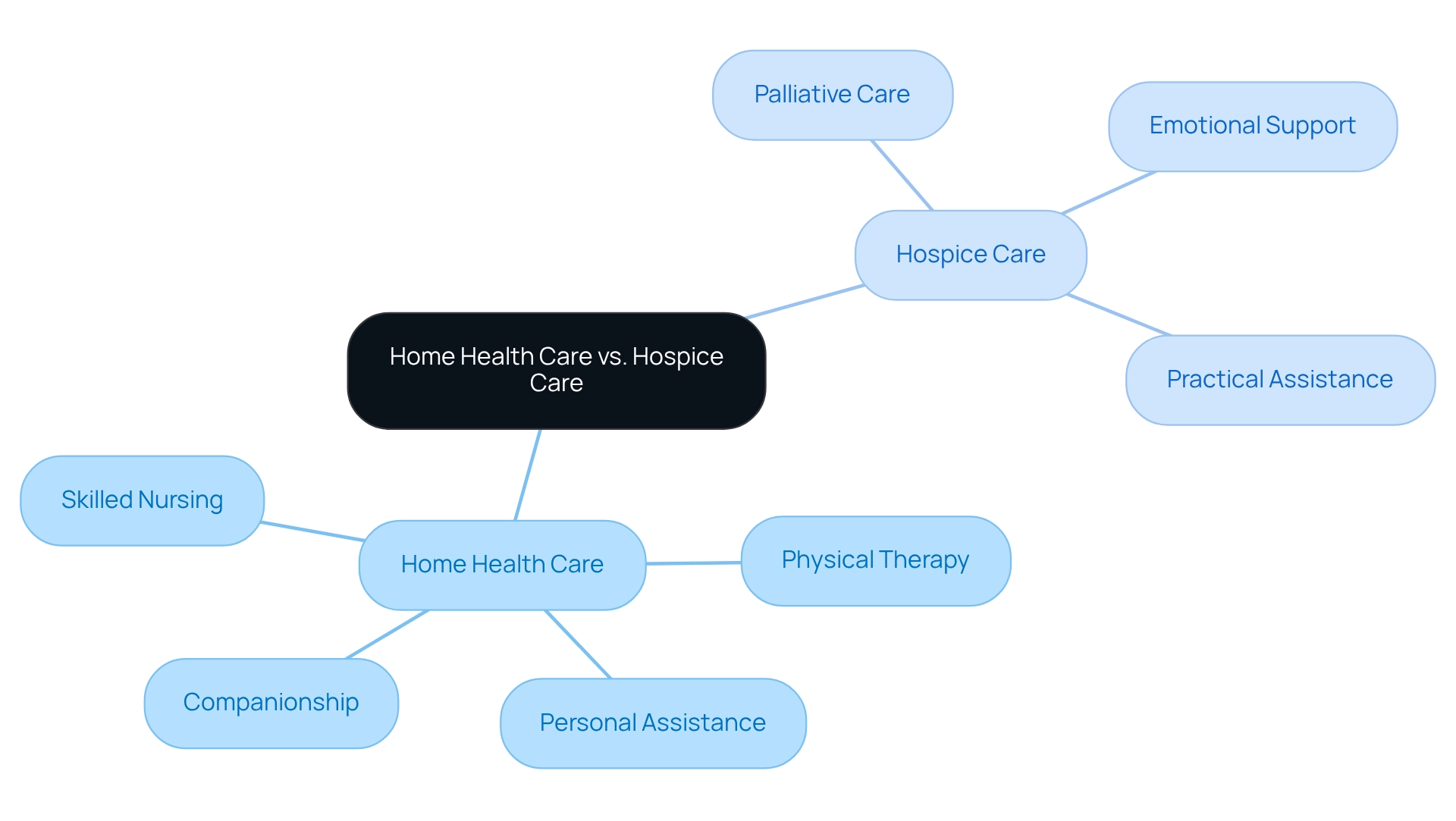
Types of Services Provided in Home Health Care
Home assistance encompasses a variety of services designed to meet the unique needs of individuals in their own homes. At Best Care Nurses Registry, we are committed to providing comprehensive in-home health care services that prioritize flexibility, companionship, and personalized support for those in need. Here are the key components of our care:
- Skilled Nursing: Our registered nurses (RNs) play a vital role in delivering medical care, administering medications, and closely monitoring well-being. Their expertise is essential in addressing complex health challenges, ensuring individuals receive the appropriate interventions to maintain their health.
- Physical Therapy: Physical therapists are crucial in helping individuals regain mobility and strength through customized exercise programs. This rehabilitation is especially important for those recovering from surgery or injury, as it aids in restoring function and enhancing overall quality of life.
- Occupational Therapy: Occupational therapists focus on empowering patients to perform daily activities independently. By enhancing the abilities needed for everyday living, they significantly improve the quality of life for individuals facing physical or cognitive challenges.
- Home Health Aides: These dedicated assistants provide essential personal support services, such as bathing, grooming, and meal preparation. Their assistance is invaluable for individuals who may struggle with daily tasks, ensuring they maintain dignity and comfort in their homes.
- Companionship Services: Companions offer important social interaction and emotional support, helping to alleviate feelings of loneliness and isolation. This aspect of care is particularly significant for elderly individuals, as social engagement is linked to improved mental well-being.
- Palliative Support: This specialized service focuses on providing relief from the symptoms and stress associated with serious illnesses. By prioritizing comfort and quality of life, palliative support assists both individuals and their families during challenging times.
As we look ahead to 2025, the landscape of residential wellness services continues to evolve, with a growing emphasis on personalized and flexible service delivery. Statistics reveal that 14.1% of domestic episodes lead to hospital admissions, underscoring the importance of effective home health care support to prevent complications and enhance outcomes for individuals. The successful application of skilled nursing and therapy in residential settings has demonstrated significant improvements in patient mobility and overall well-being, highlighting the effectiveness of these services.
Moreover, adult day services have emerged as a supportive option for families, offering meals, companionship, and activities tailored for the elderly. Despite the challenges posed by the COVID-19 pandemic, this sector is anticipated to rebound, providing essential support for caregivers and families alike. With our extensive experience and strong reputation as a preferred choice for in-home health care services in South Florida, Best Care Nurses Registry remains dedicated to delivering high-quality, compassionate support tailored to the needs of each individual.
We understand that financial considerations are important, which is why we offer flexible payment options, including assignment of benefits from long-term support insurance, private pay, and more, with no minimum hours required for service. It is also essential to recognize that the work environment for personal support aides can be physically and emotionally demanding, necessitating adherence to safety guidelines and proper lifting techniques to minimize the risk of injury and infection.
Call (888) 203-2529 to schedule a consultation and discover how Best Care Nurses Registry can assist you and your loved ones. We’re here for you, and your comfort is our priority.
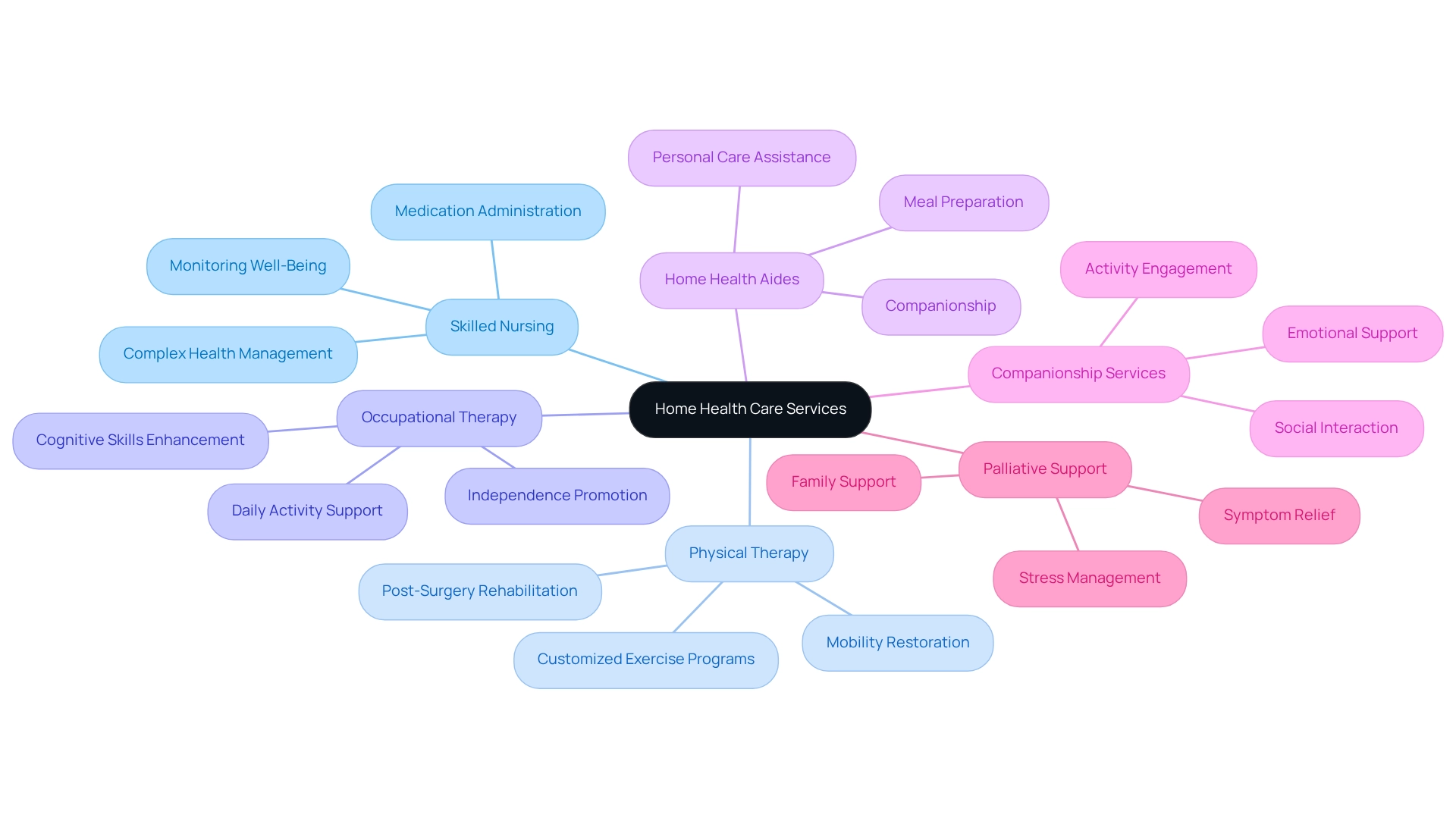
Who Provides Home Health Care? Understanding Caregiver Roles
Home wellness services are provided by a diverse group of specialists, each playing a vital role in ensuring comprehensive support for patients.
- Registered Nurses (RNs): RNs are essential in the home wellness environment. They assess patient needs, create personalized treatment plans, and deliver medical interventions. Often overseeing other caregivers, they ensure that assistance is provided efficiently and safely. Their expertise is crucial for managing complex health situations and coordinating support among team members.
- Licensed Practical Nurses (LPNs): Working under the guidance of RNs, LPNs provide vital medical support, including administering medications, monitoring vital signs, and assisting with basic medical procedures. Their training equips them to deliver quality care while supporting RNs in executing treatment strategies.
- Home Health Aides: These caregivers are instrumental in assisting individuals with daily living tasks, such as bathing, dressing, and meal preparation. Although they may lack formal medical training, their contributions are invaluable for providing companionship and ensuring comfort for those receiving care. Typically, there is about 1.5 domestic support aides per individual in residential settings, highlighting their importance in delivering personalized assistance.
- Therapists: Physical and occupational therapists are critical to the recovery journey, working closely with individuals to improve mobility and enhance daily functioning. They implement treatment plans as directed by physicians, helping individuals regain independence and improve their quality of life.
- Social Workers: Social workers assist families in navigating the emotional and logistical challenges of caregiving. They provide resources, support, and guidance, ensuring families feel prepared to manage the complexities of medical care.
As we look ahead to 2025, the roles of caregivers in residential support continue to evolve, with an increasing emphasis on collaboration among RNs, LPNs, and aides. This cooperative approach not only enhances the quality of care but also fosters a nurturing environment for individuals and their families. The commitment to high-quality, compassionate service is reflected in the extensive experience and strong reputation of providers like Best Care Nurses Registry, a trusted name in domestic support since 1980.
Sherie Garzon, a dedicated matchmaker at Best Care, applies her unique skills to ensure clients are paired with the most suitable caregivers, enriching the overall experience. In fact, in 2020, approximately 3.0 million patients received and completed care, underscoring the significant impact of domestic support services. Best Care also strives to maximize long-term support insurance benefits and offers various payment options, further solidifying its leadership in the residential wellness sector.
At-home assistance is not only economical and convenient but also provides essential emotional support for elderly individuals and their families, ensuring safety and joy in their living spaces.
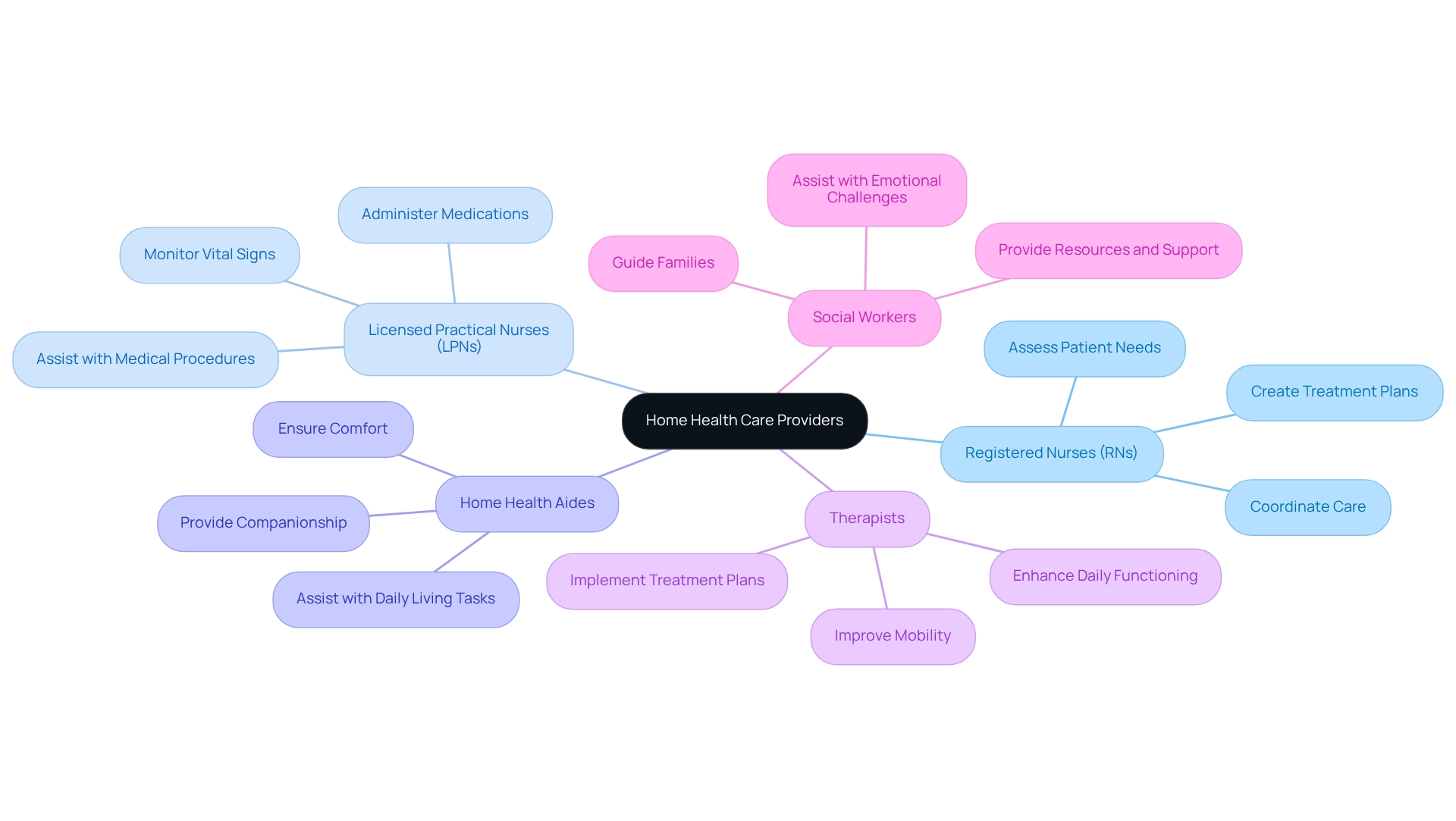
When to Transition from Home Health Care to Hospice Care
Moving from home support to hospice services is a significant decision that often becomes necessary when a patient’s condition worsens and curative treatments are no longer an option. Recognizing the signs that indicate a need for hospice care is essential for families navigating this challenging time. Key indicators to consider include:
- Frequent hospitalizations or emergency room visits, suggesting a decline in health stability.
- A noticeable deterioration in health status or an increased reliance on caregivers for daily activities, which may indicate the need for additional support services.
- Unmanageable pain or symptoms that are difficult to control, affecting the individual’s quality of life.
- A prognosis of six months or less to live, as confirmed by a physician.
Current guidelines highlight the importance of having prompt conversations with healthcare providers about the individual’s condition and preferences. Engaging in these discussions can facilitate a smoother transition, ensuring that the focus remains on comfort and quality of life. It’s important to note that many individuals are referred to hospice services late in their disease phases, underscoring the need for families to recognize these indicators quickly.
Statistics show that patients receiving adequate home health care services face significantly lower risks of challenging transitions at the end of life. For instance, a study indicated that more frequent and longer-duration services in home health care are linked to a decreased likelihood of early transitions to hospice support. This is further supported by the case study titled “Characteristics of Home Healthcare and Their Effects,” which found that timely and adequate home health care correlates with lower risks of burdensome transitions.
In addition, expert opinions suggest that a multidisciplinary approach to transitioning individuals to hospice can enhance goal-concordant support without necessitating inpatient hospital admissions. As Dr. Christopher W. Baugh, MD, MBA, noted, “a multidisciplinary program to transition individuals near the end of life to hospice was linked to a 2.4-fold increase in goal-concordant hospice support without requiring inpatient hospital admission.” Families are encouraged to discuss these options with their healthcare providers, ensuring that their loved ones receive the most compassionate and suitable support during this critical phase.
Furthermore, individuals should have access to speech, physical, and occupational therapy in hospice services, which is vital for comprehensive support. Recognizing the importance of CNA/HHA caregiver services can also play a crucial role in this transition, as these professionals are trained to assist with daily living activities and medical needs, ensuring that patients receive the care they need during this delicate period.
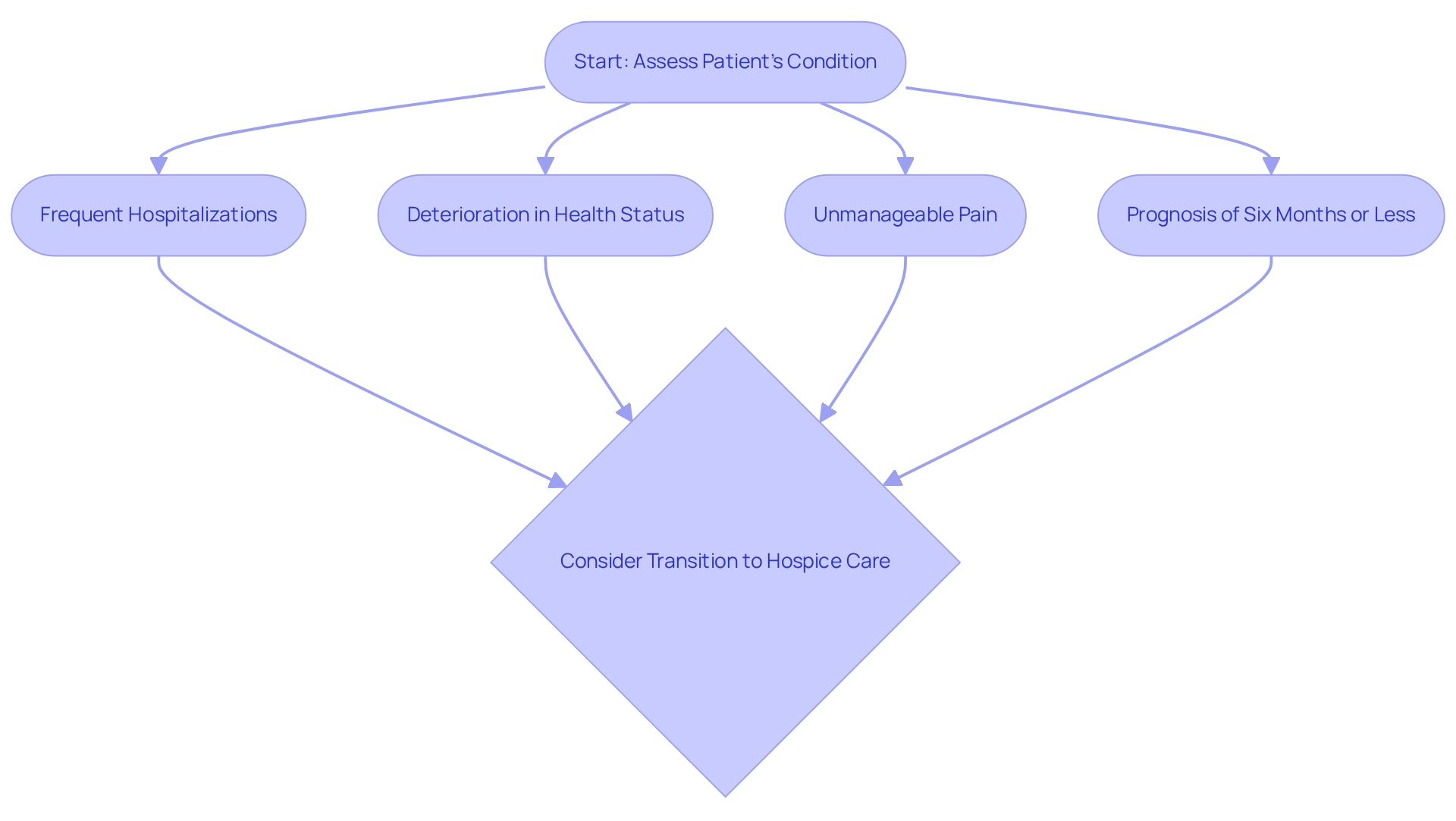
Choosing the Right Home Health Care Provider: Tips for Families
Choosing the right home health care provider is a critical decision that requires careful consideration of several key factors:
- Assess Your Needs: Start by identifying the specific services required based on the individual’s health condition and daily living needs. This may involve support with personal assistance, companionship, or specialized nursing services provided by our devoted Private Duty RNs and LPNs in home health care at Best Care Nurses Registry.
Take time to research providers like Best Care Nurses Registry, which has been offering tailored assistance in home health care in South Florida since 1980. Look for positive reviews and ensure they hold the necessary licenses and accreditations. Examining their standing within the community can offer perspective on the standard of service they provide.
- Interview Potential Providers: Engage in conversations with potential providers to inquire about their experience, caregiver qualifications, and the range of services they offer. At Best Support, our empathetic team is dedicated to understanding your distinct requirements and developing a customized support plan that ideally serves you or your loved one.
- Compatibility: It is vital to ensure that caregivers are compatible with the patient’s personality and preferences. Best Care Nurses Registry provides a tailored caregiver matching service, ensuring that the chosen caregiver cultivates a trusting relationship that improves comfort and effectiveness in assistance.
- Discuss Costs and Insurance: Clarify the payment options available and confirm whether the provider accepts your insurance plan. Understanding the financial aspects upfront can help avoid unexpected costs later on. Our team is here to discuss your situation and help navigate these details.
- Trust Your Instincts: Ultimately, choose a provider that resonates with your family’s values and needs. Trust your instincts about their capability to provide quality support, as this assurance is vital for a successful caregiving relationship.
In recent years, statistics have indicated that families frequently evaluate an average of three to five residential support providers before reaching a conclusion. This comprehensive assessment procedure is crucial, as it can result in enhanced outcomes for individuals receiving care. For example, research conducted from 2019 to 2024 showed that 87.3% of domestic episodes led to individuals improving their walking ability, highlighting the effectiveness of in-home support in enhancing mobility and overall well-being.
Furthermore, in home health care, services enable individuals to receive assistance in their own residences, which can result in enhanced patient satisfaction and fewer hospital readmissions.
As mentioned by JCS, “One of the more intriguing discoveries of this work is that caregivers felt more content with their own support than non-caregivers but experienced greater difficulty accessing services.” This emphasizes the significance of caregiver satisfaction in the overall quality of support provided.
It is also important to acknowledge the limitations of studies in this field, such as their cross-sectional design and potential underrepresentation of uninsured individuals, which can affect the generalizability of the findings.
By adhering to these guidelines and interacting with Best Care Nurses Registry, families can make informed decisions that guarantee their loved ones receive the personalized and empathetic support they deserve. For more information or to discuss your needs, call us at (888) 203-2529.
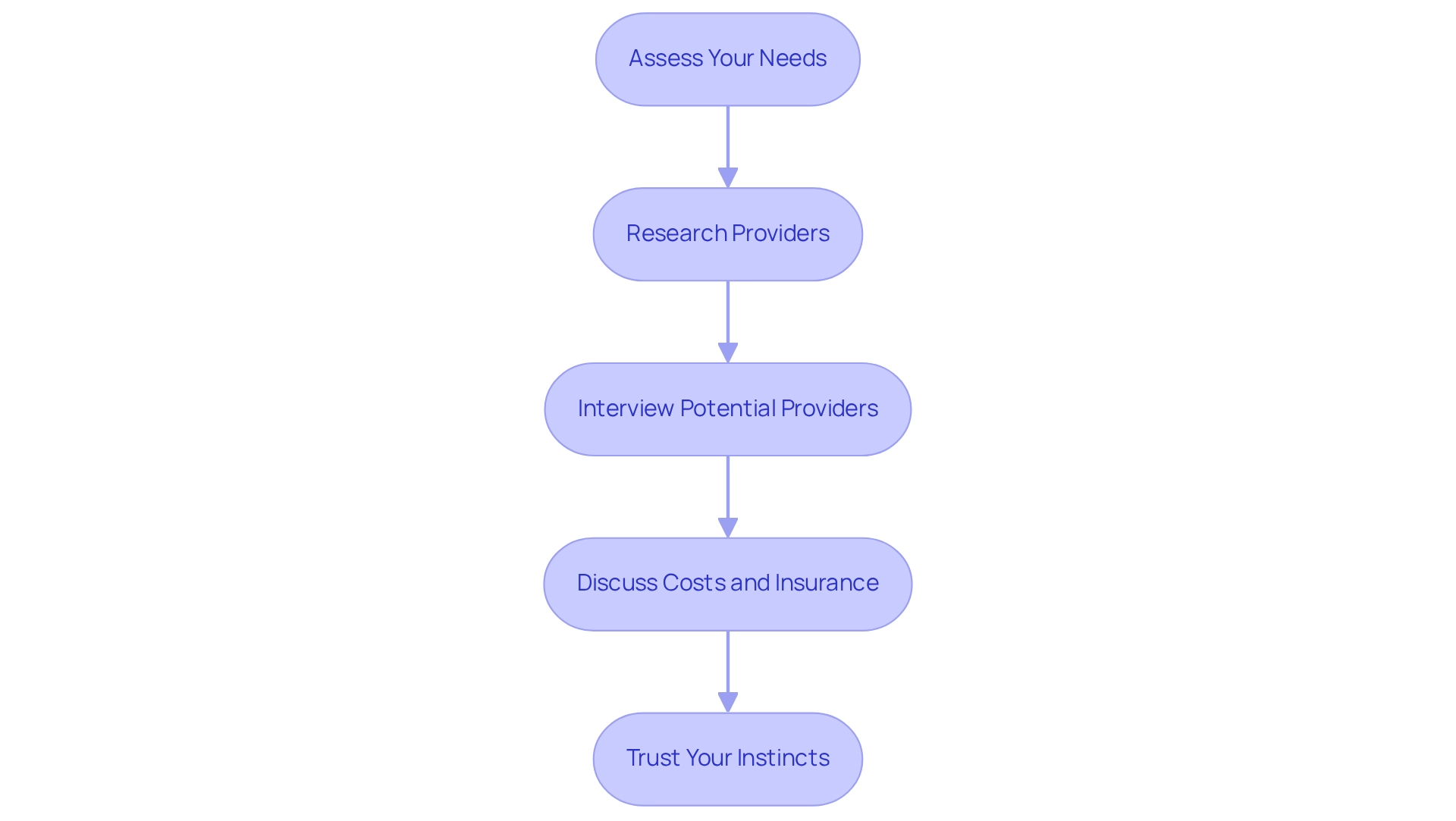
Understanding Costs and Insurance for Home Health Care
Understanding the costs associated with residential support services is vital for families seeking assistance for their loved ones. Here are several key considerations to keep in mind:
- Cost Variability: Home health care expenses can vary significantly based on the type of services needed, the level of care required, and geographic location. In South Florida, families typically encounter rates ranging from $20 to $50 per hour for caregiver services. This variability highlights the importance of assessing individual needs and comparing options. For context, Louisiana and Mississippi offer the lowest residential assistance costs at approximately $21 per hour, showcasing the pricing differences across regions.
- Insurance Coverage: Medicare may cover certain in-home care services if deemed medically necessary. It’s essential for families to verify coverage specifics with their insurance providers. Understanding which services are included and any potential out-of-pocket expenses can facilitate better planning. Best Care Nurses Registry accepts most Long Term Care insurances directly on behalf of clients, streamlining the process and reducing upfront costs.
For those with long-term support insurance, reviewing the policy is crucial to identify which services are covered in home health care. Many policies offer a range of options for in-home assistance, providing financial support for families. Best Care Nurses Registry assists clients in understanding their policies and managing essential paperwork, ensuring families can access the assistance they need without unnecessary delays.
- Payment Options: Discussing payment plans with chosen providers can uncover flexible options tailored to families’ financial situations. Agencies like Best Care Nurses Registry offer various payment methods, including private payment, governmental support, and community programs, which can ease the financial burden of at-home assistance.
- Current Trends: As we move into 2025, trends indicate a growing recognition of the importance of insurance coverage for residential health services. Families are increasingly exploring diverse payment avenues, such as life insurance conversions and reverse mortgages, to manage costs effectively.
Vicki Demirozu, a specialist in domestic assistance with 30 years of experience, emphasizes, “Understanding the costs and available options is essential for families to make informed decisions about in-home support.”
By grasping these factors, families can make informed choices that align with their financial capabilities while ensuring their loved ones receive the necessary support. Best Care Nurses Registry, with its extensive experience and strong reputation, stands out as a preferred choice for personalized and compassionate care in home health care services in South Florida.
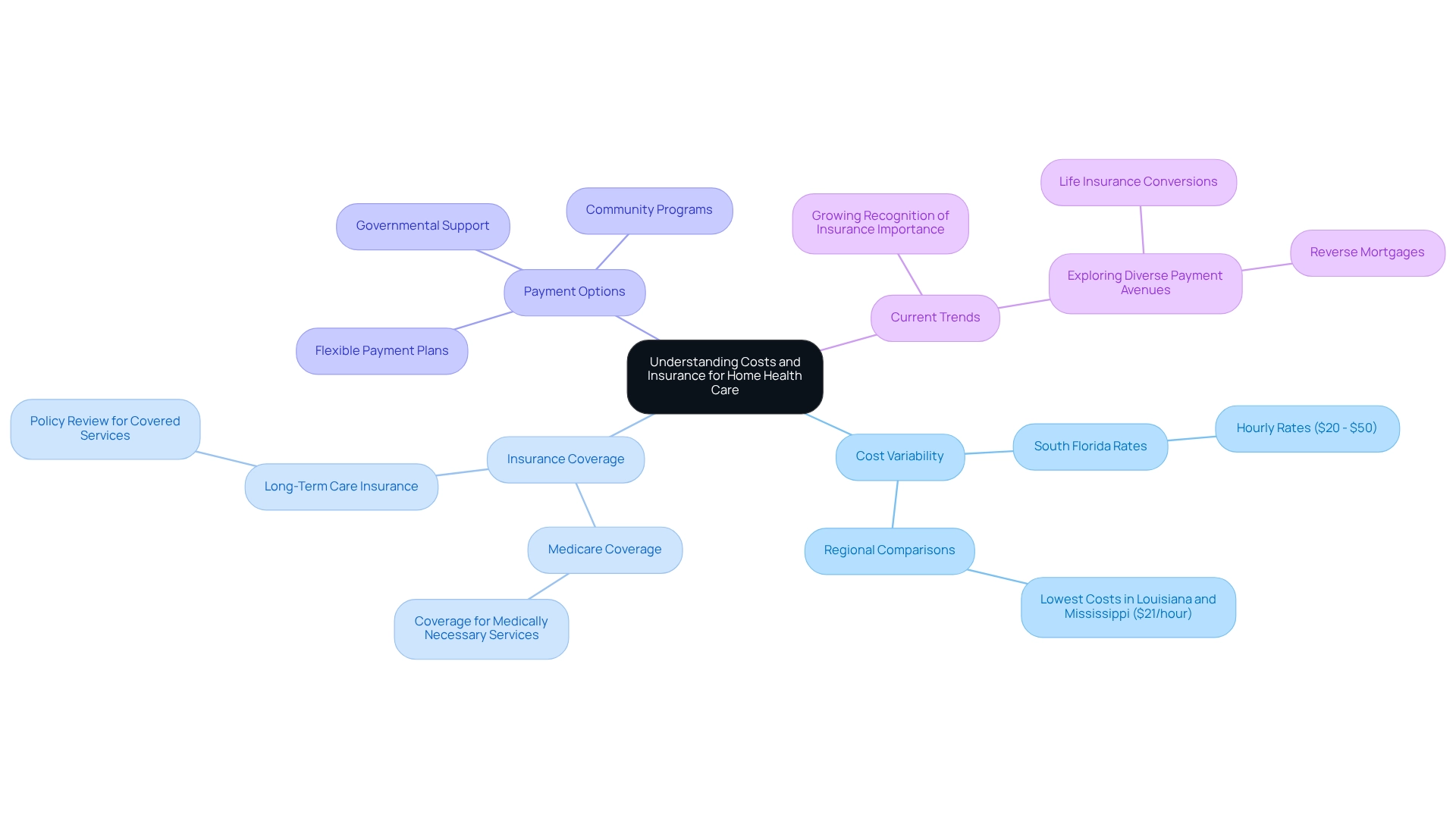
Navigating Challenges in Home Health Care: Solutions for Families
Overseeing home wellness services can present numerous challenges that families must navigate to ensure their loved ones receive the best possible care. It’s important to recognize these issues and explore effective solutions together.
- Communication Gaps: Open lines of communication among family members, caregivers, and healthcare providers are essential. Regular check-ins and updates help address concerns promptly and foster a collaborative care environment. Utilizing communication tools, such as shared messaging applications or family gatherings, can enhance transparency and ensure everyone is on the same page.
- Caregiver Burnout: Caregiver burnout is a significant concern, with research indicating that family caregivers often experience higher levels of mental distress and chronic health conditions compared to noncaregivers. For instance, a study analyzing data from the Behavioral Risk Factor Surveillance System revealed that caregivers reported higher rates of lifetime depression and unfavorable health indicators. To combat this, family caregivers should prioritize self-care and consider respite services when necessary. Best Care Nurses Registry offers flexible respite assistance services, allowing families to customize support for caregivers and individuals of all ages. Additional help or adult day services can provide vital relief, enabling caregivers to recharge. The Zarit Burden Interview (ZBI), developed by Zarit et al., highlights the personal burden caregivers feel, underscoring the need for support.
- Coordination of Services: Effectively organizing services is crucial for managing complex medical needs. Keeping detailed records of medications, appointments, and treatment plans can simplify this process. Families can benefit from shared calendars or health management apps, which help coordinate schedules among family members and caregivers, ensuring everyone is informed and involved. Best Care Nurses Registry assists families in navigating these complexities, ensuring that support is tailored to individual needs.
- Adapting to Changes: Patients’ conditions can change unexpectedly, requiring adjustments in support plans. Families should remain prepared for these changes by regularly reassessing support needs and consulting healthcare professionals for guidance. This proactive approach allows for timely adjustments to treatment strategies, ensuring that the patient’s evolving needs are effectively addressed.
The severity of caregiver burnout is highlighted by recent reports indicating that a significant percentage of unpaid caregivers have seriously contemplated suicide, emphasizing the urgent need for integrated support strategies. By addressing these challenges with practical solutions, including the flexible home care options available through Best Care Nurses Registry, families can enhance the quality of care provided to their loved ones while also supporting the well-being of caregivers. This holistic approach not only improves health outcomes but also cultivates a more sustainable caregiving environment.
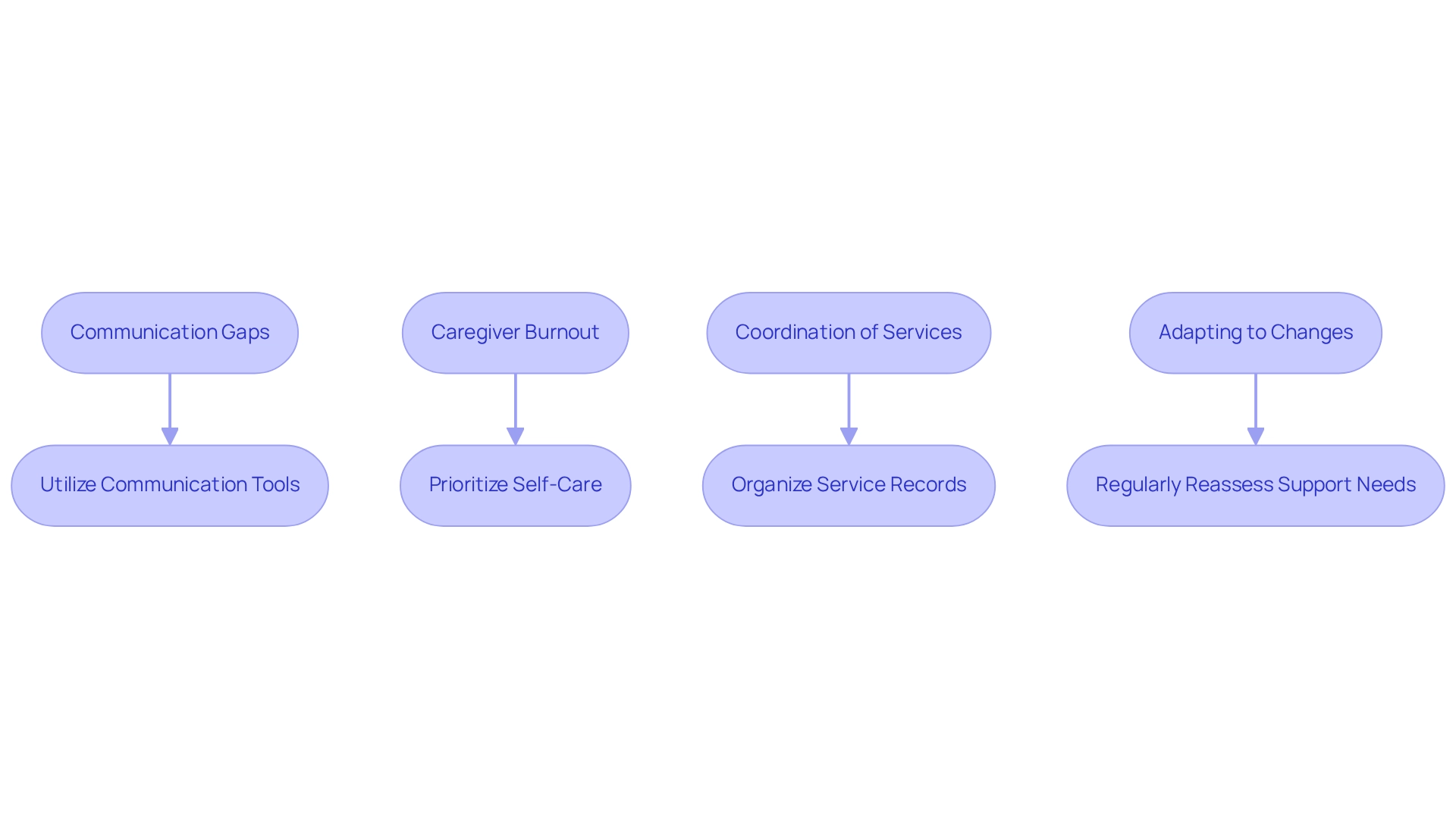
Conclusion
Home health care is not just a service; it is a vital and compassionate option for families seeking personalized support for their loved ones. This approach allows patients, especially seniors and those with chronic conditions, to receive essential medical services in the comfort of their own homes, promoting both independence and emotional well-being.
Understanding the difference between home health care and hospice care is crucial for families. While home health care focuses on rehabilitation and recovery, hospice care emphasizes comfort for those facing terminal illnesses. Recognizing when to transition between these types of care can significantly enhance a patient’s experience and overall quality of life.
Choosing the right provider is essential to ensure high-quality care. Families should thoughtfully evaluate their specific needs, conduct thorough research on potential providers, and ensure caregiver compatibility. Additionally, understanding costs and insurance coverage is vital for making informed financial decisions.
As the home health care landscape evolves, families must also address challenges such as caregiver burnout and care coordination. Utilizing resources from trusted providers can help navigate these complexities effectively, ensuring that families feel supported every step of the way.
In summary, home health care offers a compassionate solution that elevates the quality of life for patients while supporting their dignity and independence. By prioritizing personalized care in a familiar environment, families can foster emotional stability and improve health outcomes for their loved ones. Remember, we’re here for you, and your comfort is our priority.
Frequently Asked Questions
What is in-home medical support?
In-home medical support encompasses a broad range of wellness services provided directly at an individual’s residence, tailored to address specific needs. It is typically delivered by health professionals such as registered nurses, licensed practical nurses, therapists, and home health aides.
What types of services does Best Care Nurses Registry offer?
Best Care Nurses Registry offers skilled nursing support, physical therapy, occupational therapy, and assistance with activities of daily living (ADLs) such as bathing, dressing, and meal preparation.
How does in-home medical support benefit individuals?
In-home medical support helps individuals maintain their independence and comfort in a familiar environment, enhances their sense of dignity, and promotes emotional wellness.
What are the trends in home health care services?
There is a notable trend towards residential support services, with an anticipated demand for 924,000 personal support workers and in-home support workers between 2021 and 2031, reflecting the growing preference for at-home assistance.
How does home assistance differ from hospice services?
Home assistance focuses on rehabilitation and recovery, providing medical support and personal assistance for individuals recuperating from illness or injury. In contrast, hospice services are designed for individuals facing terminal illnesses, prioritizing comfort and quality of life over curative measures.
What types of support are provided in hospice care?
Hospice care involves palliative care, emotional support, and practical assistance for individuals with terminal illnesses and their families throughout the end-of-life process.
Why is understanding the distinctions between home support and hospice services important?
Understanding these distinctions helps families make informed decisions about the most suitable type of support for their loved ones, ensuring they receive the appropriate care based on their needs.
How can families access services from Best Care Nurses Registry?
Families can contact Best Care Nurses Registry at (888) 203-2529 to discuss their requirements and arrange a consultation for personalized support planning and assistance.











